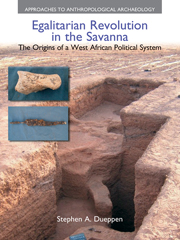Book contents
- Frontmatter
- Dedication
- Contents
- List of Figures
- List of Tables
- Acknowledgments
- 1 Decentralization and the Evolution of Egalitarian Behaviors in Sedentary Societies
- 2 Ancient Villages in the Niger Bend: Context and Methods for Exploring the Voltaic Region
- 3 Ethnographic Perspectives on Western Burkina Faso: A Survey
- 4 Kirikongo: An Introduction to the Site, the Setting, and the Research Design
- 5 The West African Environmental Setting: Kirikongo in Ecological Context
- 6 Stratigraphies and Depositional Episodes: The Excavations
- 7 Relative Chronology: Ceramics
- 8 Community Growth at Kirikongo: The Spatial and Temporal Setting
- 9 Early Sedentary Life in the Voltaic Region: Defining a ‘Voltaic Tradition’
- 10 Craft Production at Kirikongo: The Origins, Development and Reinterpretation of Specialization
- 11 Herding, Farming, and Ritual Sacrifice: The Economy from Kirikongo
- 12 Death and Ritual Objects at Kirikongo: House-Based Social Differentiation
- 13 Archaeological Patterns and Social Process: Reconstructing Changing Life at Kirikongo
- 14 Land, Spiritual Power, and Gerontocracy: An Exploration of the Roots of Egalitarian Revolution in the Western Voltaic Region
- 15 Hierarchy and Egalitarianism within the Niger Bend: Revolution and the Triumph of Communalism
- Bibliography
- Index
12 - Death and Ritual Objects at Kirikongo: House-Based Social Differentiation
- Frontmatter
- Dedication
- Contents
- List of Figures
- List of Tables
- Acknowledgments
- 1 Decentralization and the Evolution of Egalitarian Behaviors in Sedentary Societies
- 2 Ancient Villages in the Niger Bend: Context and Methods for Exploring the Voltaic Region
- 3 Ethnographic Perspectives on Western Burkina Faso: A Survey
- 4 Kirikongo: An Introduction to the Site, the Setting, and the Research Design
- 5 The West African Environmental Setting: Kirikongo in Ecological Context
- 6 Stratigraphies and Depositional Episodes: The Excavations
- 7 Relative Chronology: Ceramics
- 8 Community Growth at Kirikongo: The Spatial and Temporal Setting
- 9 Early Sedentary Life in the Voltaic Region: Defining a ‘Voltaic Tradition’
- 10 Craft Production at Kirikongo: The Origins, Development and Reinterpretation of Specialization
- 11 Herding, Farming, and Ritual Sacrifice: The Economy from Kirikongo
- 12 Death and Ritual Objects at Kirikongo: House-Based Social Differentiation
- 13 Archaeological Patterns and Social Process: Reconstructing Changing Life at Kirikongo
- 14 Land, Spiritual Power, and Gerontocracy: An Exploration of the Roots of Egalitarian Revolution in the Western Voltaic Region
- 15 Hierarchy and Egalitarianism within the Niger Bend: Revolution and the Triumph of Communalism
- Bibliography
- Index
Summary
The treatment of an individual at the end of life often materializes their social roles and identity during life. As has been described at some length in previous chapters (see also Goody 1962), the ancestors play a central role in the lives of living Voltaic communities, since they maintain the well-being of various social (cultural) groups in the natural world. Individual houses and the community (through the founding house) are conceptualized as everlasting entities with named ancestors. Even in Voltaic societies where the membership of a house can change every generation (e.g. the Gouin), former house members still act as a unit in funerals (Dacher 1997a). In Gourounsi villages, where descent plays a particularly important role in social organization, early twentieth-century accounts even recorded the construction and use (ritual petitioning through diverse sacrifices) of false huts over the tombs of ancestors (Tauxier 1912).
In Bwa villages, funerals are a rare occasion when large groups of people get together, and individual roles in ceremony and ritual are codified (Cremer 1924, 1927; Capron 1973; Bicaba 1975). In particular, smiths are responsible for digging the graves, as well as performing rituals involving the spirits of the earth in the tomb. Griots perform music at various points, as dancing is common. Specialists receive compensation in the form of cowries and food, including the products of animal sacrifices that are common in mortuary ceremonies. In the oral accounts collected by Cremer (1924, 1927), Bwa ritual and social practices associated with death and burial vary significantly according to the particular social categories and life history of the deceased. Some of the most elaborate treatment is reserved for the village and house headmen owing to their important ritual/political roles in the community.
- Type
- Chapter
- Information
- Egalitarian Revolution in the SavannaThe Origins of a West African Political System, pp. 261 - 273Publisher: Acumen PublishingPrint publication year: 2012



